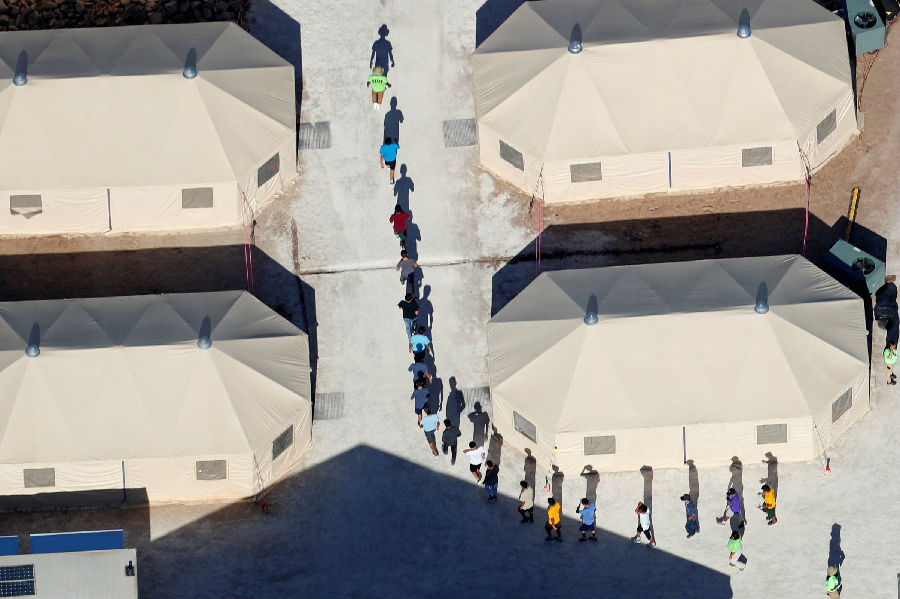In a postwar world divided between the West and communism, America assumed the role of beacon.
戰(zhàn)后,西方世界和共產(chǎn)主義世界彼此分裂,美國(guó)承擔(dān)了燈塔這一角色。
Presidents spoke relentlessly of democracy, humanitarianism and universal rights.
總統(tǒng)們不停談及民主、人道主義和普世權(quán)利。
“Go to the United States, that’s the place,” was what Ivars Kalnins’ parents heard in the displaced persons camp
“去美國(guó)吧,那才是你該去的地方,”伊瓦爾斯·卡爾寧斯的父母就曾在難民營(yíng)地聽過(guò)這樣的話,
where the family lived for five years after World War II, having fled their native Latvia ahead of the Soviets.
二戰(zhàn)結(jié)束后,他們先于蘇聯(lián)人逃離了祖國(guó)拉脫維亞,在難民營(yíng)地生活了足足五年。
Kalnins’ father, as a city official, was a target for the Communists.
卡爾寧斯的父親,他曾是一名市政官員,成了共產(chǎn)黨的目標(biāo)。
The young family ended up in the southwestern Wisconsin hamlet of Burton,
在圣保羅路德會(huì)——我父親后來(lái)就去了那里布道——會(huì)眾家庭的贊助下,
sponsored by the families of St. Paul Lutheran, where my father later preached.
這個(gè)年輕的家庭最后去了威斯康星州西南部的伯頓村。
Kalnins’ dad started out as a hired hand, doing the chores for local farmers that Mexicans now do, for half the wages a local would demand.
卡爾寧斯的父親便從農(nóng)場(chǎng)雇工做起,只拿當(dāng)?shù)厝艘话氲墓べY為當(dāng)?shù)剞r(nóng)民打雜,如今,那些雜活已經(jīng)成了墨西哥人的工作。
His son, Ivars Kalnins, grew up to be a lawyer and ardent Trump supporter.
他的兒子伊瓦爾斯·卡爾寧斯長(zhǎng)大后成了一名律師,也成了特朗普的狂熱支持者。
“My opinion on immigration basically is, wait your turn,” Kalnins says.
“我對(duì)移民的看法基本上就是,輪到你了再說(shuō),”卡爾寧斯說(shuō)。
“We waited five years. I don’t have any time or use for people sneaking in.
“我們都等了五年。我沒工夫,也沒地兒招待那些偷偷溜進(jìn)美國(guó)的人。

You can’t blame them for wanting a better life.
他們想過(guò)好日子,這點(diǎn)怨不了他們。
On the other hand, we can’t take in the whole world here, because everyone wants a better life.
但另一方面,我們這兒也接納不了所有人,因?yàn)槿巳硕枷脒^(guò)好日子。
It’s up to them to make the place they’re from a better place.”
要不要把家鄉(xiāng)建設(shè)好,決定權(quán)在他們自己手里。”
Kalnins’ journey from refugee to Trump loyalist is as complex and nuanced as the immigration issue, then and now.
從難民變成特朗普的忠實(shí)支持者,卡爾寧斯的轉(zhuǎn)變和移民問(wèn)題這些年所發(fā)生的轉(zhuǎn)變一樣復(fù)雜,一樣微妙。
His grandmother, who had sufered a nervous breakdown from incessant shelling, ended up in Britain,
他的祖母,因?yàn)椴粩嗟呐趽艋忌狭松窠?jīng)衰弱,最后去了英國(guó),
having been told the U.S. was not accepting refugees who were disabled physically or mentally.
因被告知美國(guó)不接受存在身體殘疾或精神殘疾的難民。
(“So there’s your family separation,” he says. “I’ve been through it. It happens.”)
(“這就是家庭分離啊,”他說(shuō)。“我自己也經(jīng)歷過(guò)。這種情況確實(shí)是會(huì)發(fā)生。”)
But it was a Republican, Reagan, who extended amnesty to undocumented immigrants,
問(wèn)題是,是一名共和黨人——里根將非法移民納入了特赦范圍,
and a Democrat, Obama, who deported more immigrants than any previous President and detained families, a policy abhorred by liberal critics.
是一名民主黨人——奧巴馬驅(qū)逐了比以往任何一位總統(tǒng)驅(qū)逐的都多的移民,還推出了扣留移民家庭這一遭到自由派批評(píng)人士的唾棄的政策。
But Obama also spoke of America’s lofty values with an eloquence that intentionally sought to echo Reagan.
但奧巴馬還是以明顯模仿里根的口吻談到了美國(guó)崇高的價(jià)值觀。
“Nobody did this like Ronald Reagan did,” says Stuckey.
“沒有人達(dá)到了羅納德·里根的高度,”斯塔基說(shuō)。
“Reagan could talk about national identity in ways that even liberals would nod their head and say, yes, I see myself there.”
“里根談?wù)撈鹈褡逭J(rèn)同時(shí),就連自由派也會(huì)忍不住點(diǎn)頭說(shuō),是的,我也這么認(rèn)為。”
譯文由可可原創(chuàng),僅供學(xué)習(xí)交流使用,未經(jīng)許可請(qǐng)勿轉(zhuǎn)載。



